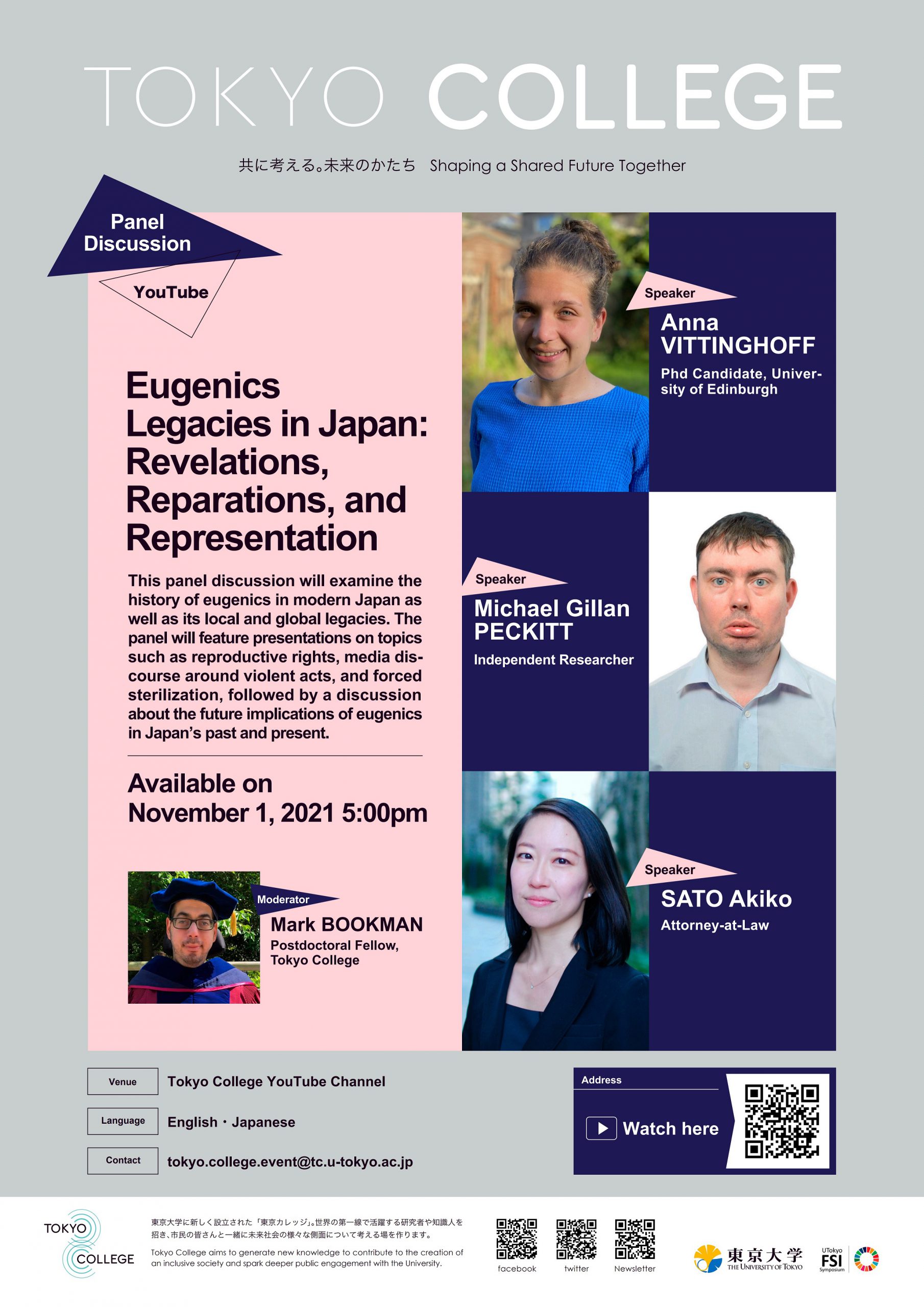Eugenics Legacies in Japan: Revelations, Reparations, and Representation

| Date(s) | Monday, 1 November 2021, Available from 5:00pm |
|---|---|
| Venue | |
| Language | English and Japanese |
| Abstract |
A panel discussion, organized by Mark Bookman and hosted by Tokyo College (the University of Tokyo), to examine the history of eugenics in modern Japan as well as its local and global legacies. The panel will feature presentations from Anna Vittinghoff, Michael Gillan Peckitt and Akiko Sato on topics such as reproductive rights, media discourse around violent acts, and forced sterilization. It will also include discussion about the future implications of eugenics in Japan’s past and present. |
| Program |
Moderator Mark BOOKMAN(Postdoctoral Fellow, Tokyo College) Speakers Anna VITTINGHOFF (Phd Candidate, University of Edinburgh) Michael Gillan PECKITT (Independent Researcher) SATO Akiko(Attorney-at-Law) |
| Speaker Profile |
Mark Bookman Mark Bookman is a historian of disability in Japanese and global contexts based at the University of Tokyo. He holds PhD and MA degrees from the University of Pennsylvania, and a BA from Villanova University. Mark’s research has been supported by various grants and awards, including a Fulbright U.S. Student Fellowship to Japan and a Japan Foundation Doctoral Fellowship. His scholarship on disability inclusion can be found in peer-reviewed journals such as Japan Focus: The Asia-Pacific Journal and public-facing media outlets like The Japan Times and Japan Today. Outside of the academy, Mark also works as an accessibility consultant. He has collaborated with government agencies and corporate entities in Japan, the United States, and Canada, as well as the International Paralympic Committee and United Nations, on projects related to inclusive education, equitable transportation, and disaster risk management for diverse populations of disabled people. For additional information about Mark Bookman, see his website: www.bookmanresearch.com. Anna Vittinghoff Anna-Viktoria Vittinghoff is a PhD Candidate in Japanese Studies at the University of Edinburgh, UK. Her research uses theories of bio-power to examine the intersection of radical feminism and the disability movement in Japan from the 1970s to the present day. She is supported by the Great Britain Sasakawa Foundation and the Japan Foundation Endowment Committee. Michael Gillan Peckitt Born in Sheffield, the UK in 1978, Michael studied Philosophy at the University of Hull, obtaining his Bachelor’s degree in 2001 and his PhD in 2010. He has had left-sided spastic hemiplegic cerebral palsy and epilepsy since birth. He was a tutor at Hull University from 2003-2006. From April 2012 until September 2013 he was an Honorary Visiting Researcher at the University of Tokyo. Michael was a tutorial assistant and later part time lecturer at Osaka University from 2013 until 2021 and he lives in Kobe, Japan. Akiko Sato Akiko has been engaged in human rights issues specialized in Access to Justice for socially vulnerable people including persons with disabilities, and Business and Human Rights. As a member of the Committee on human rights of the elderly and persons with disabilities at the Japan Federation of Bar Associations, she has been involved in advocacy for persons with disabilities. Gained an MA in Development Studies major in Human Rights from International Institute of Social Studies of Erasmus University Rotterdam in The Hague and a JD from Hitotsubashi University in Tokyo. Deputy Secretary General at Human Rights Now, Tokyo based human rights NGO. |
| Organized by | Tokyo College, The University of Tokyo |















